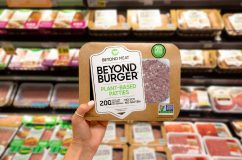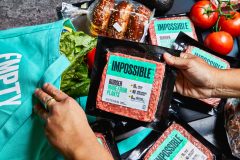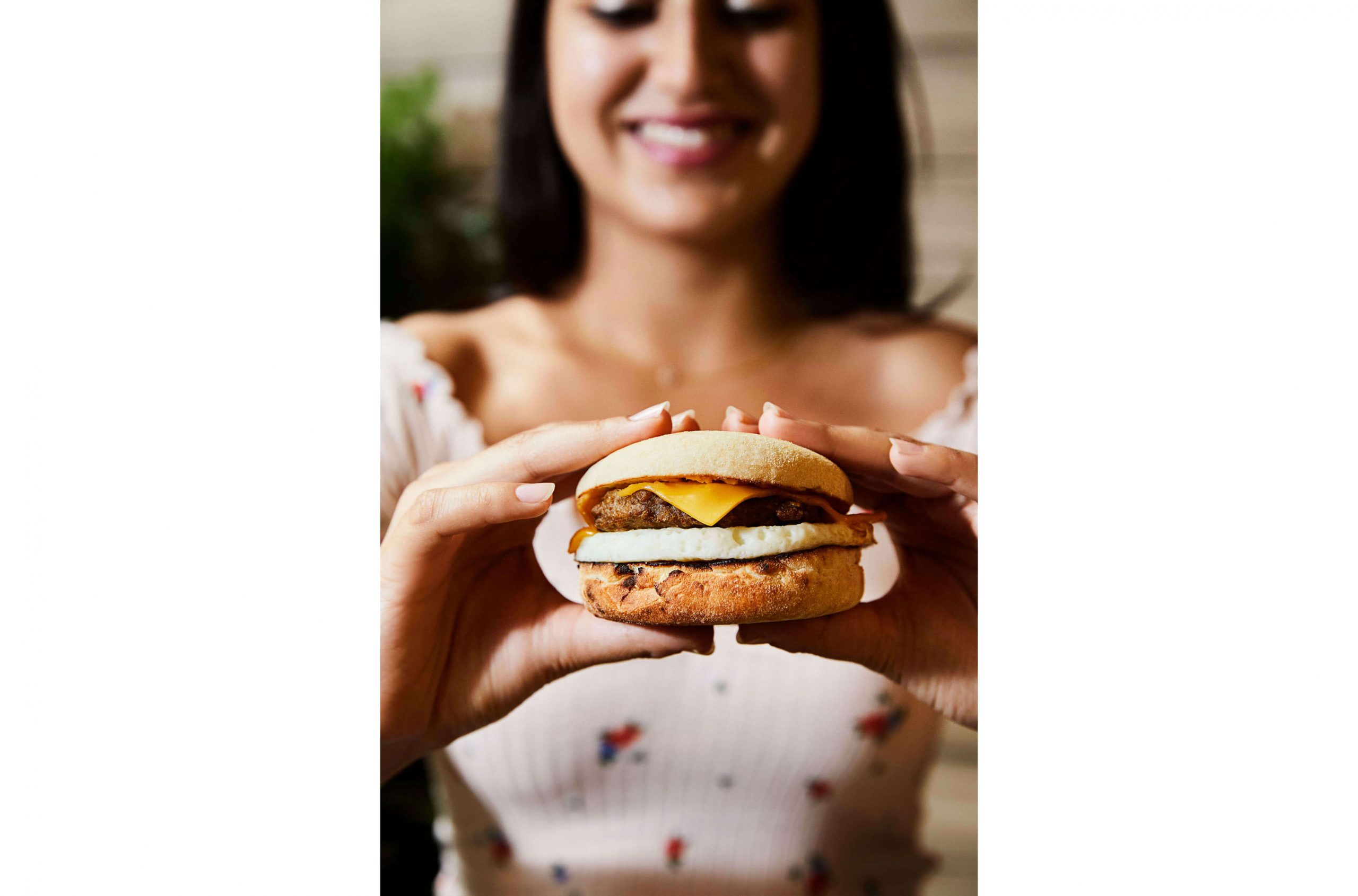by Cynthia Weifenbach, contributing writer
Two of the biggest players in the burgeoning plant-based foods industry – Beyond Meat and Impossible Foods – call the West Coast home.
Since January, Impossible Foods’ retail footprint has increased more than 30-fold, including 219 H-E-B and Central Market grocery stores across Texas and 1,700 stores owned by The Kroger Co., including Kroger, Smith’s, Ralph’s and Fred Meyer. It can also be found in 777 Albertsons Companies’ stores, including Albertsons, Jewel-Osco, Pavilions, Safeway and Vons.
Beyond Meat products are available at 25,000 grocery stores in the U.S., including Target, Walmart, Kroger and Publix.
Growth of meat alternatives
“Beyond Meat is the leader in the plant-based products meat category. We own 64 percent market share,” said Chuck Muth, chief growth officer for the El Segundo, California-based company. “Due to COVID-19, the category more than doubled in sales, with a 133 percent increase.”

According to Muth, grocers opening the meat case to meat alternatives was a big success.
“We were able to capture new consumers – not just the vegan or vegetarian consumers. Three years ago, there wasn’t an option for no animal meat, now there are several,” he said. “Our goal is to create products the consumers are happy with that are healthy, nutritious and have great taste.”
Muth credited Safeway and Kroger with being “very progressive grocers” that were open to the idea of placing Beyond Meat’s meat alternatives in the meat case.
“One year ago, we had one facing. Now you will find plant-based products in the cold case covering 2 to 4 feet of space,” he said.
Allison Aronoff, the company’s senior communications manager, said Beyond Meat is in 94,000 outlets globally and in 75 countries. “We are available in most major chains,” she added.
Headquartered in Redwood City, California, Impossible Foods has two products made entirely from plants on the market – Impossible Burger and Impossible Sausage. Launched in 2016, the Impossible Burger is available in 17,000 restaurants across the U.S., Hong Kong, Singapore and Macau, and more than 5,000 grocery stores in the U.S.
 Impossible Sausage, which debuted nationwide in June, is available in more than 20,000 shops and restaurants, including Starbucks and Burger King.
Impossible Sausage, which debuted nationwide in June, is available in more than 20,000 shops and restaurants, including Starbucks and Burger King.
According to SPINS, a wellness-focused data technology company, Beyond Meat was the No. 1 brand for all refrigerated plant-based meat and owned the four best-selling SKUs in the four-week period ending May 17.
Beyond Meat grew at a faster rate than the overall category, with total plant-based meat alternatives sales increasing 61.4 percent while Beyond Meat sales rose 133.6 percent when compared to the same four weeks in 2019.
“Food service is coming back slowly as restaurants open up,” Muth said. “At retail, the category is experiencing accelerated growth of 54 percent in just a four-week period…globally, we are seeing double- and triple-digit growth patterns. Starbucks just launched our plant-based burger for a healthier option. Our newest line is our breakfast sausages.”
Added Aronoff, “CKE, which has Carl’s Jr. in the West and Hardee’s in the East, just launched a Beyond Spicy Cheeseburger into their value pack menu items. We are pleased that we are able to offer it at the same price as beef burgers. Our goal is to make this affordable and accessible to all for a healthier option.”
Muth took it a step farther: “I project that in four years our products will be even less expensive as we iron our out processes, build scale and improves efficiencies.”
Science behind the products
Esther Cohn, senior communications specialist at Impossible Foods, explained some of the science behind the company’s meat alternatives.
“Impossible Burger is made of plant-based ingredients including soy proteins, sunflower oil and coconut oil, as well as a special ingredient called heme. The soy protein and potato protein give the burger its texture,” she said.
“The flavor is generated when heme is combined with vitamins, simple sugars, amino acids, fatty acids and heated up. The fat and sizzle come from coconut and sunflower oils. Methylcellulose – a culinary binder commonly found in ice cream, sauces and jams – brings it all together.
“Because it’s made from plants, Impossible Burger has 0 mg cholesterol, no animal hormones, antibiotics, artificial ingredients or slaughterhouse contaminants.”
Cohn noted that heme is a molecule found in all living things and what carries oxygen in blood. It’s also what makes meat taste and look like meat.
“For more than a billion years, heme has been one of the most ubiquitous and important molecules on Earth,” she said. “Every human being has eaten heme every day since the dawn of humanity. Heme is particularly abundant in meat and is a direct source of iron.”
To satisfy the global demand for meat with a tiny fraction of the environmental impact, Cohn said Impossible Foods had to develop a scalable way to make heme without animals.
“We found that by adding a plant gene to yeast cells, we could use fermentation to produce a heme protein naturally found in plants, called leghemoglobin, in essentially unlimited quantities with a tiny fraction of the environmental impact,” she said. “The heme in Impossible Burger is identical to the heme humans have been consuming for hundreds of thousands of years in meat.”
At Beyond Meat, Muth said the food scientists are challenged with finding what creates the animal product, what makes a similar taste. “They have three main goals. [The first is] taste – our products must taste as good as an animal.”
Second, he said, they must have better nutritionals, such as more fiber, iron and protein and low sodium and cholesterol. Last but not least is cost.
“It is critical that our products must be at or below the cost of animal meat,” Muth said. “Barrier is the scale; scale helps us get to that pricing.”
Plant-based dairy
According to the Plant Based Foods Association, the plant-based dairy category is growing even faster than meat alternatives as more households are introduced to the items.

The association reported that plant-based yogurt has grown 31 percent, while conventional yogurt fell 1 percent. Conventional cheese remains flat, but plant-based cheese has grown 18 percent. And plant-based milk sales grew 5 percent in the past year, making up 14 percent of the entire milk category.
“We have seen explosive growth these past few months,” said Kari Davis, brand manager for plant-based beverages at Pacific Foods in Tualatin, Oregon. “We have been in business for 30 years. Soy dairy was our first plant-based product.
“Consumer interest in the plant-based beverage category has increased across the board as they look to enhance their diet with more healthy and natural options. Our oat milk is the No. 1 seller for the past 20 years in vanilla and original flavors. There is no cane sugar in it. The sweetness comes from the oats themselves.”
The company, Davis continued, has a meal-based strategy.
“Our milks, broths and soups, whether shelf-stable or refrigerated, are more healthy, nutritional and sustainable options,” she said. “Our Golden Cauliflower and Moroccan Sweet Potato soups are the newest items in our line. And we are pleased to offer new reduced-sugar and unsweetened options, like our Reduced Sugar Oat Plant-Based Beverage.”

